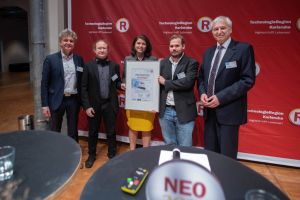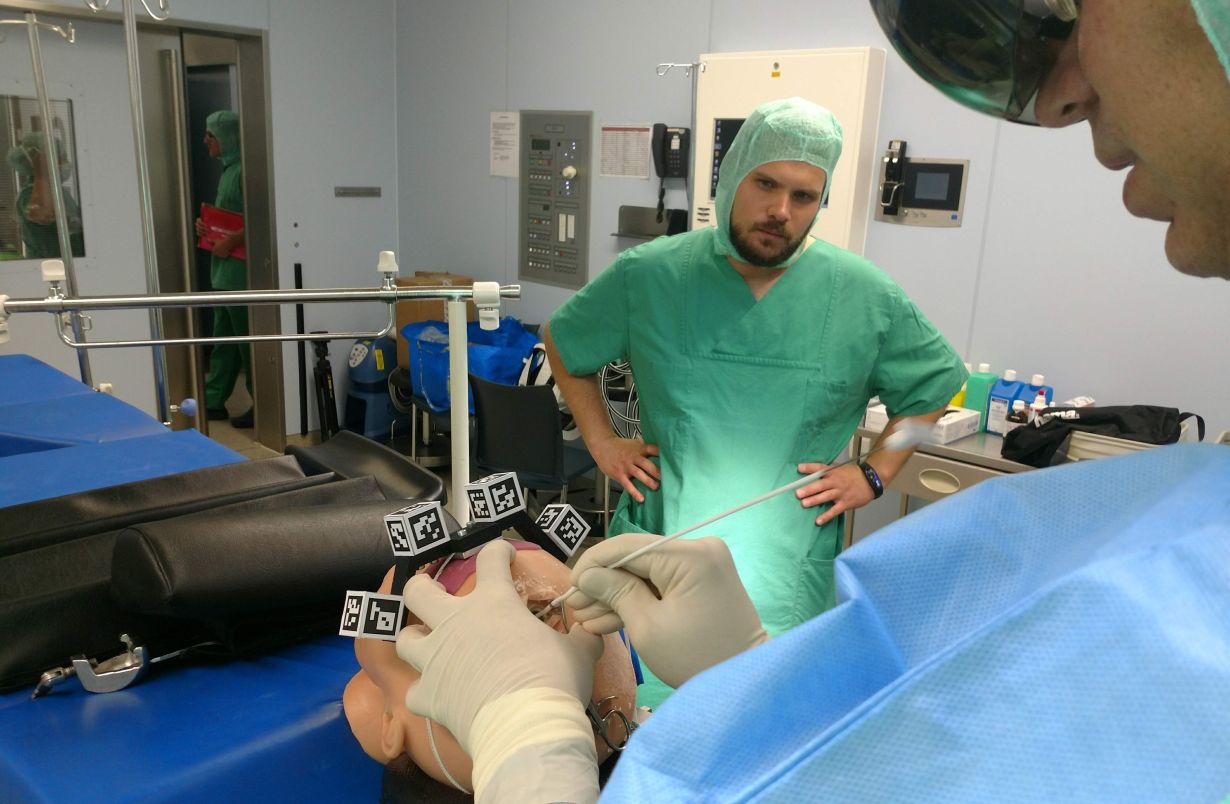Yesterday evening (October 23, 2019), the HoloMed system co-developed by Karlsruhe Institute of Technology (KIT) was granted the NEO 2019 Innovation Prize in the amount of EUR 20,000 by the Karlsruhe Technology Region. Using methods of artificial intelligence (AI), HoloMed generates a model from computer tomographies of the patient and maps on it deep-lying, invisible structures in the body. The system is to optimize the work of physicians.
“AI and resulting technologies and applications already are part of our everyday life and work. In future, however, learning systems will offer many more great possibilities to shape our economy and information society,” says the President of KIT, Professor Holger Hanselka. “I am very happy that a project from the revolutionary area of AI was successful in the NEO 2019 competition. I cordially congratulate the winning team.”
“The NEO 2019 prize confirms the high innovativeness of our scientists, which helps them transfer their findings to application and contribute to the viability of our society. The prize for HoloMed is highly deserved,” says Professor Thomas Hirth, KIT Vice-President for Innovation and International Affairs.

HoloMed was developed by researchers of KIT’s Institute for Anthropomatics and Robotics to support physicians. The focus lies on punctures of the brain, which are required in case of cerebral hemorrhage or strokes, for instance. Accumulated liquid is removed from the brain and pressure is reduced. To determine the optimal point and direction of puncture, the surgeon feels and measures various anatomic landmarks. “The difficulty consists in the fact that determination of the puncture angle often allows very few degrees of tolerance only and the physician cannot directly see the target,” says Professor Björn Hein who heads the project at KIT together with Professor Franziska Mathis-Ullrich. Only about 60% of freehand punctures reach an optimal position.
This is where HoloMed comes in. With the help of augmented reality glasses, the physician determines the puncture point and angle of the needle. As a basis, current data from the electronic patient file and CT or MRT scans of the patient are used. An artificial intelligence algorithm developed by Christian Kunz, scientist of KIT, generates a model on this basis and precisely maps deep-lying, invisible structures in the body. By displaying operation-relevant information in the field of view of the physician, the latter is enabled to optimally use the needle.
“We use machine-learning methods for the automatic determination of this information. In a first step, the augmented 3D model of the head is generated. Later, the target point is determined using this model. If necessary, the physician can always make individual corrections,” Hein says. “The system is to serve as an innovative, novel, and low-cost solution that directly enhances quality of such interventions.“ Upon successful use for puncture, HoloMed is also planned to be applied for other operations.
About Neo 2019
With the NEO Innovation Prize, the Karlsruhe Technology Region supports innovative solutions influencing our future life. Every year, the prize is granted in another area. Proposals for NEO 2019 were invited under the heading “Artificial intelligence in the world of work:” How will artificial intelligence change the working world? How can AI take repetitive tasks off our hands, improve our quality of work, and help us achieve a better work-life balance? And how will AI push Germany as a hub of innovation?
More about the KIT Information · Systems · Technologies Center:
Being “The University in the Helmholtz Association”, KIT creates and imparts knowledge for the society and the environment. It is the objective to make significant contributions to the global challenges in the fields of energy, mobility, and information. For this, about 10,000 employees cooperate in a broad range of disciplines in natural sciences, engineering sciences, economics, and the humanities and social sciences. KIT prepares its 22,800 students for responsible tasks in society, industry, and science by offering research-based study programs. Innovation efforts at KIT build a bridge between important scientific findings and their application for the benefit of society, economic prosperity, and the preservation of our natural basis of life. KIT is one of the German universities of excellence.

